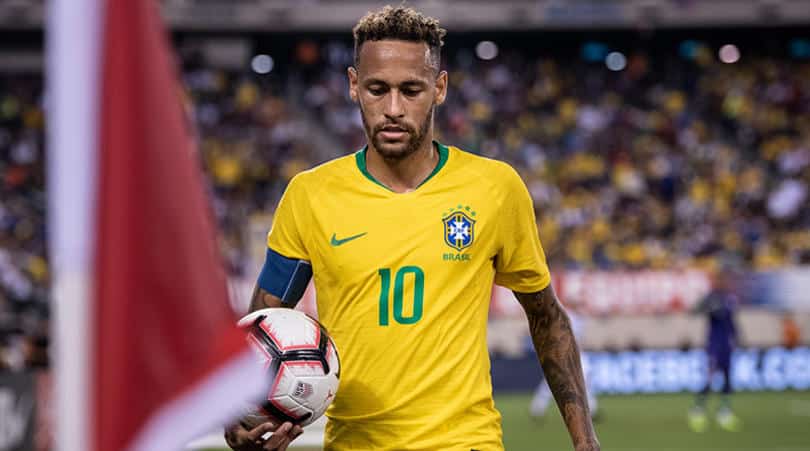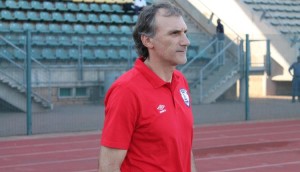We’ve donned our tin hats to pick out the best attackers on the planet, with plenty of top-class talent missing the cut.
Disclaimer: This list only features wide attackers or second strikers, so the likes of Cristiano Ronaldo, Harry Kane and Luis Suarez aren’t eligible.
10. Raheem Sterling (Manchester City)
Sterling enjoyed the best season of his career in 2017-18, scoring 23 goals and setting up another 12 for Pep Guardiola’s fearsome Manchester City. The 23-year-old doesn’t always look like the most natural finisher, but his end product has come on immensely over the last couple of years.
Sterling offers a great deal more besides goals, though, with the winger’s intelligent movement one of his standout attributes. Sterling’s off-the-ball running was a key feature of England’s attacking play at the World Cup, where he didn’t score but still contributed plenty to the cause.
9. Sadio Mane (Liverpool)
Mane’s contributions were overshadowed by Mohamed Salah’s sensational season in 2017-18, but the Senegalese speedster still found the back of the net 20 times in all competitions. He’s started the current campaign with a bang too, scoring four goals in Liverpool’s four victories in the Premier League.
A pacey, direct runner with the ball at his feet, Mane commits defenders and opens up space for others with his sharp movement in and out of possession. His shooting is excellent, combining power and precision, and last season’s tally of seven assists shows that the former Southampton flyer can provide for his team-mates too.
8. Paulo Dybala (Juventus)
Dybala has had a difficult few months for both country and club. The 24-year-old played just 22 minutes of Argentina’s disappointing World Cup campaign, largely because he was deemed to be too stylistically similar to Lionel Messi. Back at Juventus, meanwhile, he’s found himself on the bench as Max Allegri looks to build a team around Cristiano Ronaldo.
It’s inevitable that Dybala will return to the fold at some point, though, and the prospect of the 5ft 10in schemer supplying the ammunition for Ronaldo is a tantalising one. Nimble, creative and versatile, the ex-Palermo man has the potential to go right to the very top.
7. Gareth Bale (Real Madrid)
After scoring twice – one a spectacular overhead kick – in the Champions League final victory over Liverpool in May, Bale hinted that his future lay away from Real Madrid. Ronaldo’s subsequent departure changed everything, though, allowing the Welshman to take a prominent role at the Santiago Bernabeu.
Bale has responded well in the early weeks of 2018-19, and if he can stay fit he could enjoy his best season yet in the Spanish capital. Quick, direct and blessed with a tremendous left foot, the 29-year-old has the ability to win games by himself.
6. Mohamed Salah (Liverpool)
There haven’t been many more spectacular debut seasons than Salah’s in 2017-18. Signed from Roma the previous summer, the Egypt international plundered 44 goals in all competitions as Liverpool finished in the top four of the Premier League and reached the Champions League final, in which an early injury to their star man severely damaged their chances of victory.
Salah has always been blessed with the speed of a sprinter, but he’s now far more effective in the final third. Much like Arjen Robben in his heyday, defenders know that the former Chelsea man wants to cut onto his left foot and shoot… but stopping him is a different matter entirely.
5. Eden Hazard (Chelsea)
Hazard made no secret of the fact he would be willing to join Real Madrid last summer, but no offer was forthcoming and he’ll therefore remain at Stamford Bridge for at least another season. That’s brilliant news for a Champions League-less Chelsea, who have leaned heavily on Hazard during their recent title triumphs of 2015 and 2017.
Possessing wonderful trickery, balance and acceleration, the Belgium international is a master at wriggling out of tight spaces. He doesn’t score quite as regularly as a player of his extraordinary talent should, but his selflessness and team-first mentality are certainly appealing.
4. Antoine Griezmann (Atletico Madrid)
Griezmann’s decision to commit his future to Atletico Madrid in the summer felt like a significant moment for the Spanish club, who have managed to retain the services of one of the best players in the game.
In many ways, Griezmann would have been impossible for Diego Simeone to replace. The France international is a wonderful footballer who can both create and convert chances, but he’s also smart, streetwise and willing to work hard for the team – attributes which players of far lesser ability don’t always possess.
3. Neymar (PSG)
Neymar’s stock has fallen a little in the last 12 months, with his move to PSG having not yet borne the intended results and the World Cup leading to more mocking than acclaim. His willingness to go to ground certainly rubs plenty of fans up the wrong way, but even the 26-year-old’s fiercest critic would struggle to argue that he doesn’t belong in the very highest braket of talent.
A phenomenally gifted dribbler who beats opponents for fun, Neymar is a devastating – and highly influential – attacker with the numbers to back it up: the Brazilian scored 25 goals and provided 16 assists in 27 Ligue 1 and Champions League appearances last term.
2. Kylian Mbappe (PSG)
Mbappe was a household name before 2018 got under way, but this still feels like the year in which the Frenchman evolved from promising youngster to one of the very best players in the world.
His devastating displays at the World Cup (particularly in the 4-3 victory over Argentina), won’t be forgotten in a hurry; Croatia’s Luka Modric was perhaps the only player who outshone the PSG man in Russia. Frighteningly quick but also composed and intelligent, the precocious 19-year-old will be a world star for the next decade and more.
1. Lionel Messi (Barcelona)
Who else? Arguably the world’s best passer, dribbler, creator and finisher, the tag of ‘forward’ feels insufficient for a player of Messi’s unparalleled genius. The Argentine is the most complete footballer around, able to score, assist and control the tempo of a game – usually doing all three within the space of 90 minutes.
The Champions League has eluded him in the last three seasons and his list of international honours remains empty. Yet that doesn’t diminish Messi’s standing – he’s still won Europe’s foremost competition three times, after all – or negate his strong claim to be the greatest player of all time.















